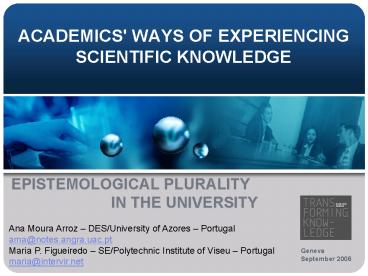ACADEMICS' WAYS OF EXPERIENCING SCIENTIFIC KNOWLEDGE - PowerPoint PPT Presentation
1 / 12
Title:
ACADEMICS' WAYS OF EXPERIENCING SCIENTIFIC KNOWLEDGE
Description:
This study aimed at exploring the way academics conceive ... heteronomous. idealistic. 10. Universities and pluralities... U N I V E R S I T Y. UNIVERSITY ... – PowerPoint PPT presentation
Number of Views:26
Avg rating:3.0/5.0
Title: ACADEMICS' WAYS OF EXPERIENCING SCIENTIFIC KNOWLEDGE
1
ACADEMICS' WAYS OF EXPERIENCING SCIENTIFIC
KNOWLEDGE
- EPISTEMOLOGICAL PLURALITY
- IN THE UNIVERSITY
Ana Moura Arroz DES/University of Azores
Portugal ama_at_notes.angra.uac.pt Maria P.
Figueiredo SE/Polytechnic Institute of Viseu
Portugal maria_at_intervir.net
Geneva September 2006
2
Purpose
- This study aimed at exploring the way academics
conceive scientific knowledge and its process of
production and validation, given its' centrality
in the scope of the activities of inquiry and
education developed by these professionals. - Besides identifying the epistemological
conceptions of academics, it was our purpose to
examine the differences and similarities between
those conceptions and to analyse the internal
structure of the detected conceptual diversity.
3
Methodology
- Combined design
RESULTS
QUANTITATIVE
QUALITATIVE
QUALITATIVE
exploratory studies (adapt. VOSTS)
extensive phase correlational multivaried
intensive phase phenomenographic
the 2 most representative elements of each
group (10 academics)
(Aikenhead, Ryan Fleming, 1989)
125 academics (56)
antirealistic constructivism (43,2)
inductivist critical realism (31)
methodological falsifiability with an
inductivist flavour (12,2) contaminated
contextualism (5,4) orthodox positivistic
realism (0,2)
4
Methodology
Participants
Data collection
10 academics
interviews
individual
professional category
professors (4 tenured6 non)
semi-structured
academic degree
PhD
sex
5 M 5 F
Data analysis
departments
5/9
phenomenography
collective space of variation
scientific domains
7 hard 3 soft
type of research problems
5 pure 5 applied
(Becher, 1995)
(Marton, 1981, 1986, 1994)
5
Conceptions
essence of the scientific knowledge
scientific enterprise
6
Scientific enterprise experienced as
... a process of development and reflexive
depuration, with steps/tasks to deal with and
overcome - deconstruction of a silenced
position, - emancipation through research
practice, - meta-research awareness. Implies
a strong commitment with ones own development
and of less experient others (novices)
professional socialization. Main purpose
hapiness for Mankind
individual asceticism
Journey (Brew, 2001) Humboldtian (Ylijoki,
2003)
...a strongly competitive game, with tacit rules
and agreements regarding knowledge justification
and circulation. To cooperate is the right
strategy for assuring the best relative position
in this game. The purpose is to get in the
spotlight, to conquer a voice in the
field. The Scientific Community is seen as an
intersubjective network of first league
players. Focus on playing, not on the purpose of
the knowledge production.
Managerial (Ylijoki, 2003)
7
Scientific enterprise experienced as
... helping to build an universal knowledge
database. Seen as an ethical commitment which
implies both accumulating and transmiting
knowldege. The purpose of Science is to know
and explain the world and make that knowledge
accessible. The University is the guardian of
knowledge and a cultural instrument of resistence
to political and economic pressure.
global database
SCIENCE ? contributes to ? SOCIETY ... a social
tool for answering/dealing with the actual needs
of the society solving practical problems and
improving the quality of life. Science with an
applied vocation and an interdisciplinary nature
dealing with the complexity of problems.
SOCIETY ? pressures ? SCIENCE Loss of autonomy
in the definition of objects and purposes of
study. Need to gain favor from the
powers. Danger of political instrumentalization
and contamination. Researchers community is
conjunctural (with minimal stable core)
social contract
Managerial (Ylijoki, 2003)
8
Scientific enterprise experienced as
...a routine and technicist activity, centered on
the individual (what I do) and under several
constrains (internal and external). Dicotomic
Scientific Community (them) the Lords of Science
versus (us) the metics. Participation but without
equal rights. The metecs dont see themselves as
having epistemological authority. And they
tacitly accept a non reclaiming status.
Consider impossible to evaluate and/or
hierarchize the quality of knowledge change in
Science comes from fashion and the will of the
Lords of Science.
metics in science
Each participant contributes to 3 and lt 5
9
Internal structure of variation
what is focused in the sci. enterprise
product
process
society
social contract
asceticism
community
game
database
scope of description
idealistic
individual
metics
perspective about sci. enterprise
heteronomous
mission
strategic
routine
determinant of the sci. work
purpose of the researcher
10
Universities and pluralities
external subjective norms -
result-oriented - accelerated
production time - academic
capitalism - financial dependency
social contract
U N I V E R S I T Y
internal subjective norms -
colaboration - internationalization
- team work -
competitivity
coop. strategic game
UNIVERSITY
Critical, agenda setting, quality and reflection,
...
11
Universities and pluralities
UNIQUE IDEOLOGY
S U B C U L T U R E S
EPISTEMOLOGICAL PLURALITY
12
WHAT SHAPES OUR COMMON GROUND?
Communication and collaborative work
- References
- Aikenhead, G., Ryan, A Fleming, R. (1989).
VOSTS Views on Science Technology Society.
Saskatoon University of Saskachewan. - Becher, T. (1996). Academic tribes and
territories. Intellectual enquiry and the
cultures of disciplines (3rd ed.). Bristol SRHE
Open University. - Brew, A. (2001). Conceptions of research a
phenomenographic study. Studies in Higher
Education, 26 (3), 271-285. - Gibbons, M., Limoges, C., Nowotny, H.,
Schwartzman, S., Scott, P., Trow, M. (1994).
The new production of knowledge the dynamics of
science and research in contemporary societies.
London Sage. - Marton, F. (1981). Phenomenography Describing
conceptions of the world around us. Instructional
Science, 10, 177-200. online. Disponível
http//www.ped.gu.se/ biorn/phgraphy/misc/constr/
phegraph.html (2001, Outubro, 23) - Marton, F. (1986). Phenomenography A research
approach to investigating different
understandings of reality. Journal of Thought, 21
(3), 28-48. - Marton, F. (1994). Phenomenography. In T. Husén
T. N. Postlewaite (Eds.), International
encyclopedia of education, 2nd ed. (vol.8, pp.
4424-4429). London Pergamon. - Ylijoki, O.-H. (2003, Julho). Contested
identities and moral orders in academia.
Comunicação apresentada na 2.ª International
Conference Knowledge Discourse Speculating on
Disciplinary Futures, Hong Kong, Web
proceedings. online. Disponível
http//ec.hku.hk/kd2proc/proceedings/fullpaper/The
me1 FullPapers/YlijokiOiliHelena.pdf (2004,
Abril, 7).































